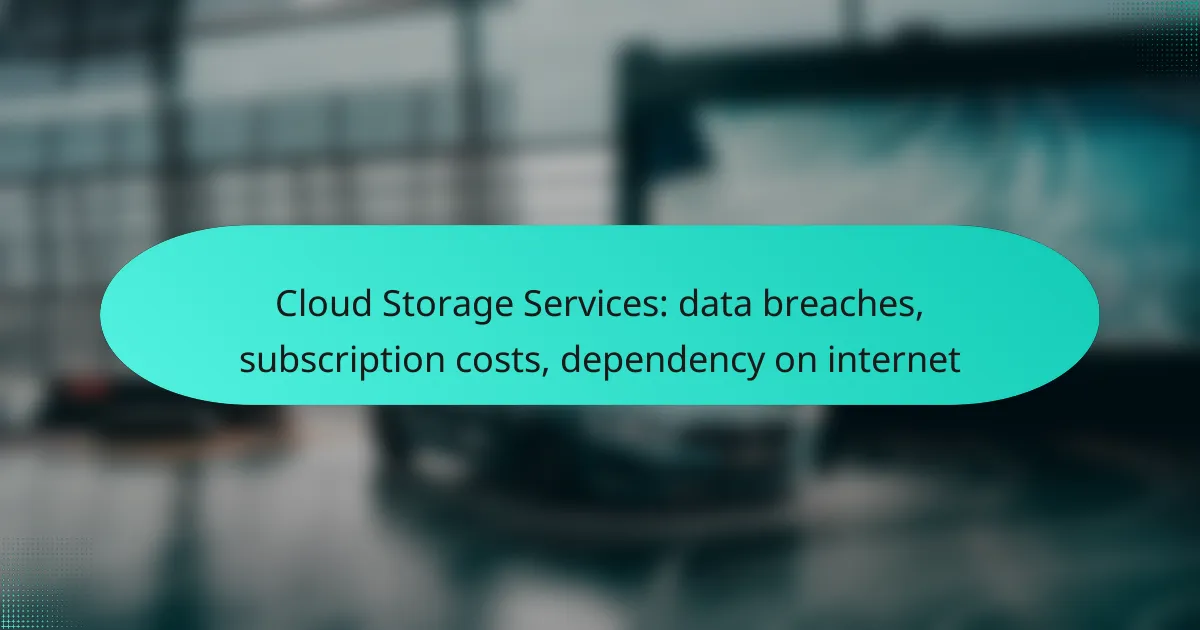Cloud storage services have become essential for individuals and businesses alike, providing a convenient way to store and access data online. However, concerns about data breaches, varying subscription costs, and dependency on internet connectivity highlight the need for careful consideration when choosing a provider. Understanding these factors can help users select the best cloud storage solution that balances security, affordability, and accessibility.

What are the best cloud storage services in Canada?
The best cloud storage services in Canada offer a mix of reliability, security, and affordability. Key options include Google Drive, Dropbox, Microsoft OneDrive, Amazon S3, and iDrive, each catering to different needs and budgets.
Google Drive
Google Drive is a popular choice for both personal and business use, providing 15 GB of free storage and seamless integration with other Google services. Its collaborative features allow multiple users to edit documents in real-time, making it ideal for teams.
Subscription plans start at around CAD 2.49 per month for 100 GB, with higher tiers available for larger storage needs. Users should consider the potential for data breaches and ensure they enable two-factor authentication for added security.
Dropbox
Dropbox is known for its user-friendly interface and strong file-sharing capabilities. It offers 2 GB of free storage, which can be increased through referrals or paid plans. Dropbox is particularly favored by creative professionals for its file versioning and recovery options.
Paid plans begin at approximately CAD 13.99 per month for 2 TB of storage. Users should be aware of the dependency on a stable internet connection, as large file uploads can be time-consuming without it.
Microsoft OneDrive
Microsoft OneDrive integrates well with Windows and Office 365, making it a convenient option for users of Microsoft products. It offers 5 GB of free storage, with paid plans starting at around CAD 2.99 per month for 100 GB.
OneDrive’s security features include personal vaults and file encryption, which help protect sensitive information. Users should regularly review sharing settings to maintain control over their data.
Amazon S3
Amazon S3 (Simple Storage Service) is designed for developers and businesses needing scalable storage solutions. It does not offer a free tier but charges based on usage, making it suitable for variable workloads.
Pricing can range from CAD 0.023 to CAD 0.026 per GB per month, depending on the region and storage class. Users should familiarize themselves with AWS pricing models to avoid unexpected costs, especially if data transfer is involved.
iDrive
iDrive is a robust cloud storage service that offers 5 GB of free storage and comprehensive backup options. It is particularly useful for users looking to back up multiple devices, including computers and mobile phones.
Plans start at around CAD 69.50 per year for 5 TB of storage, making it a cost-effective choice for extensive data needs. Users should regularly check backup settings to ensure all important files are included and up-to-date.

How do data breaches affect cloud storage services?
Data breaches can severely compromise cloud storage services by exposing sensitive user information and undermining the security measures in place. When a breach occurs, it can lead to unauthorized access to files, loss of data integrity, and significant financial repercussions for both providers and users.
Common causes of data breaches
Data breaches often result from a variety of factors, including weak passwords, phishing attacks, and software vulnerabilities. Human error, such as misconfigured security settings, can also play a significant role in these incidents. Additionally, insider threats, where employees intentionally or unintentionally expose data, are a growing concern.
Impact on user trust
When a cloud storage service experiences a data breach, user trust can diminish rapidly. Customers may feel their personal information is not secure, leading to a reluctance to use the service or share sensitive data. This erosion of trust can result in decreased customer retention and a negative reputation in the market.
Examples of major breaches
Several high-profile data breaches have highlighted vulnerabilities in cloud storage services. For instance, the 2019 breach of a major cloud provider exposed the personal data of millions of users, prompting widespread concern. Another example is the 2020 incident where a popular file-sharing service suffered a breach that compromised sensitive corporate data, leading to significant financial losses and legal repercussions.

What are the subscription costs for cloud storage in Canada?
In Canada, cloud storage subscription costs vary widely based on the provider and the storage capacity needed. Most services offer tiered pricing plans that cater to both individual users and businesses, with options ranging from free basic plans to premium subscriptions costing several dollars per month.
Google Drive pricing
Google Drive offers a free tier with 15 GB of storage, which is shared across Google services. For additional storage, users can opt for Google One plans starting at approximately CAD 2.79 per month for 100 GB, with higher tiers available for larger capacities.
Consider the benefits of integrating Google Drive with other Google services, such as Google Docs and Sheets, which enhance productivity. However, be mindful of the shared storage limit across services, which may require upgrading if you use multiple Google applications.
Dropbox pricing
Dropbox provides a free plan with 2 GB of storage, suitable for light users. Paid plans start at around CAD 13.49 per month for 2 TB of storage, which is ideal for users needing more space for files and collaboration.
Dropbox is known for its user-friendly interface and strong collaboration features, making it a popular choice for teams. However, users should evaluate their storage needs carefully, as costs can add up with higher-tier plans.
Microsoft OneDrive pricing
Microsoft OneDrive offers 5 GB of free storage, with paid plans beginning at about CAD 2.99 per month for 100 GB. For users who need more storage, the Microsoft 365 subscription includes 1 TB of OneDrive storage along with access to Office applications for a monthly fee of around CAD 10.99.
OneDrive’s seamless integration with Microsoft Office products is a significant advantage for users already within the Microsoft ecosystem. Keep in mind that the free tier may not suffice for extensive file storage, prompting a potential upgrade.
Amazon S3 pricing
Amazon S3 operates on a pay-as-you-go model, meaning costs are based on the amount of data stored and transferred. Pricing starts at approximately CAD 0.023 per GB for the first 50 TB per month, making it suitable for businesses with varying storage needs.
This model allows for flexibility, but users should monitor their usage closely to avoid unexpected charges. Amazon S3 is ideal for developers and businesses needing scalable storage solutions, but it may not be as user-friendly for casual users compared to other services.

How does dependency on the internet affect cloud storage?
Dependency on the internet significantly impacts cloud storage by determining access speed, reliability, and overall user experience. Without a stable internet connection, accessing stored data can be challenging, leading to potential delays and interruptions.
Access limitations
Access limitations arise when users experience poor internet connectivity or outages. In such cases, files stored in the cloud may become temporarily inaccessible, hindering productivity. Users should consider having offline access options or backup solutions to mitigate these risks.
Additionally, geographical restrictions may limit access to certain cloud services. Some providers may not be available in specific regions due to regulatory issues, which can affect users’ ability to utilize their preferred storage solutions.
Performance issues
Performance issues are common when internet speeds fluctuate or are below optimal levels. Slow connections can lead to longer upload and download times, making it frustrating to work with large files. Users should aim for a reliable internet connection, ideally with speeds above 25 Mbps for seamless cloud storage performance.
Moreover, latency can affect real-time collaboration on cloud platforms. High latency can result in delays during file sharing or editing, which can disrupt teamwork and project timelines.
Data retrieval challenges
Data retrieval challenges can occur when users need to access large amounts of data quickly. If the internet connection is slow, retrieving files can take significantly longer than expected, impacting workflows. Users should plan for potential delays and prioritize which files they need to access first.
In some cases, cloud services may implement throttling during peak usage times, further complicating data retrieval. To avoid these issues, users should consider using services that offer robust performance guarantees and have a track record of reliability during high-demand periods.

What criteria should be considered when choosing a cloud storage service?
When selecting a cloud storage service, key criteria include security features, cost-effectiveness, and storage capacity. Evaluating these factors helps ensure that the service meets your specific needs while safeguarding your data.
Security features
Security features are crucial for protecting your data from unauthorized access and breaches. Look for services that offer encryption, both in transit and at rest, as well as two-factor authentication to enhance your account’s security.
Additionally, consider the provider’s compliance with industry standards such as GDPR or HIPAA, especially if you handle sensitive information. Regular security audits and a clear incident response plan are also indicators of a reliable service.
Cost-effectiveness
Cost-effectiveness involves assessing the pricing structure of cloud storage services in relation to the features offered. Many providers offer tiered pricing plans, which can range from free basic accounts to premium subscriptions costing tens of dollars per month.
Evaluate whether the service provides a good balance between price and features, such as storage limits, bandwidth, and customer support. Be cautious of hidden fees for exceeding storage limits or additional features that may increase costs unexpectedly.
Storage capacity
Storage capacity is a vital consideration, as it determines how much data you can store in the cloud. Most services offer a range of options, from a few gigabytes for free accounts to several terabytes for paid plans.
Assess your current and future storage needs to choose a plan that accommodates growth without frequent upgrades. Some providers also allow you to scale your storage as needed, which can be a cost-effective solution for fluctuating requirements.
